Countries, global health groups band together as US aid gaps threaten lives

By Jennifer Rigby and Aaron Ross
Governments and global health groups are working to try to fill the most urgent gaps in the fight against diseases such as malaria and HIV, including sharing tests and treatments internationally, after the U.S. government froze foreign aid funding.
The Trump administration said this week it has cut more than 80% of programmes, which health groups say threatens efforts to tackle deadly diseases across the globe. Some programmes have survived or been reinstated, but funding remains scarce, and the future unclear.
“We are trying to say to countries: ‘Ok, you have more commodities, your neighbouring country does not have them, could you potentially give them some until we figure out a way of going ahead?’,” said Michael Adekunle Charles, head of the RBM Partnership to End Malaria.
The World Health Organization and other groups have also said they are working with countries to fill gaps in HIV testing and treatment, in a similar way to during the COVID pandemic when countries shared resources to prevent shortages.
Some governments, such as Kenya and Malawi, have moved staff and are discussing emergency financing, but the funds are limited and staff are not necessarily trained in the disease areas they have been deployed to, experts said.
Florence Riako Anam, co-executive director of the Global Network of People Living with HIV, said many countries supported by donor funding had already been working on roadmaps to take more control of their HIV work domestically.
But that does not solve the immediate issues.
“The problem we are facing today is facing all neighbouring countries ... so I think that is a challenge,” said Nelson Otwoma, director of the National Empowerment Network of People Living with HIV/AIDS in Kenya, referring to the potential to share medical tools.
Countries should also prioritise the most lifesaving interventions, including treatment and bednets for prevention, said Joy Phumaphi, executive secretary of the African Leaders Malaria Alliance.
“We must all work together to fill the immediate gaps while planning for longer term financing solutions,” she said.
This article was produced by Reuters news agency. It has not been edited by Global South World.